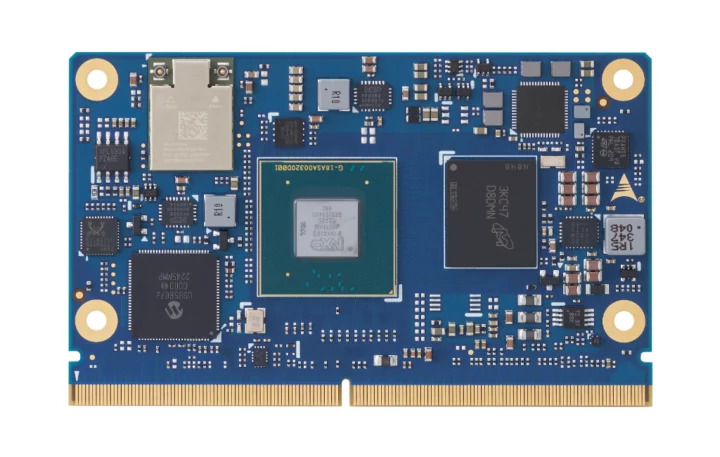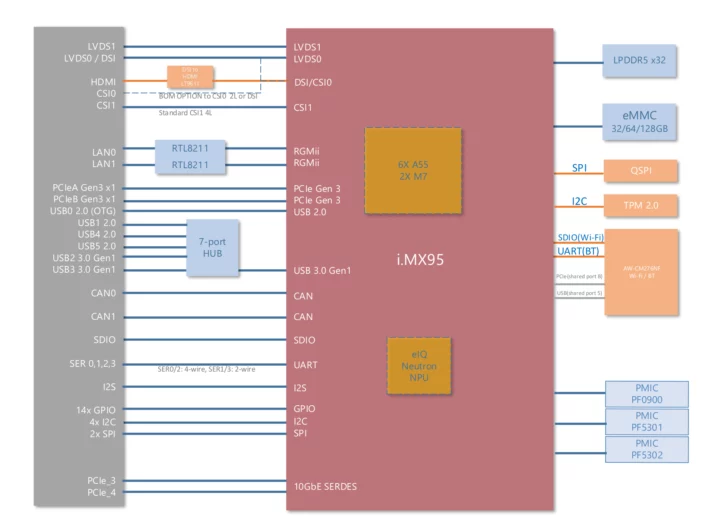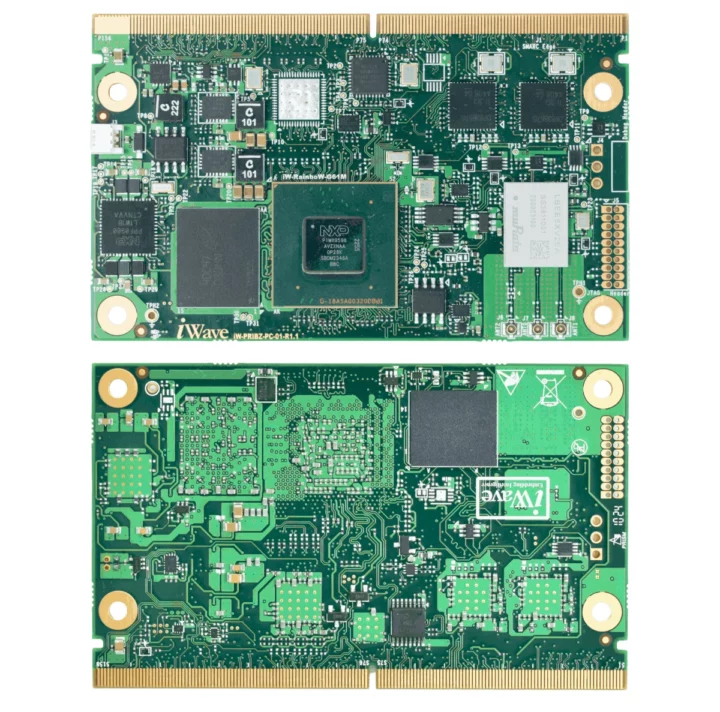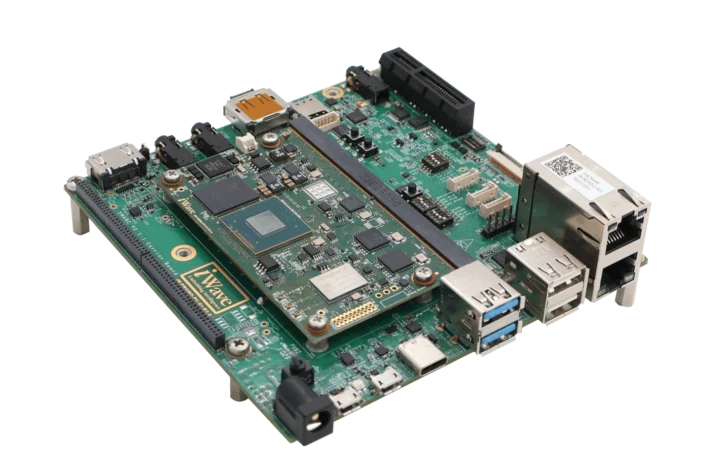Several companies have unveiled SMARC 2.1 compliant system-on-modules powered by the NXP i.MX 95 AI SoC, and today we’ll look at the ADLINK LEC-IMX95 and iWave Systems iW-RainboW-G61M and related development/evaluation kits.
The NXP i.MX 95 SoC was first unveiled at CES 2023 with up to six Cortex-A55 application cores, a Cortex-M33 real-time core, and a low-power Cortex-M7 core, as well as an eIQ Neutron NPU for machine learning applications. Since then a few companies have unveiled evaluation kits and system-on-modules such as the Toradex Titan evaluation kit or the Variscite DART-MX95 SoM, but none of those were compliant with a SoM standard, but at least two SMARC 2.1 system-on-modules equipped with the NXP i.MX 95 processor have been introduced.
ADLINK LEC-IMX95
Specifications:
- SoC – NXP i.MX 95
- CPU
- Up to 6x Arm Cortex-A55 application cores clocked at 2.0 GHz with 32K I-cache and D-cache, 64KB L2 cache, and 512KB L3 cache
- 1x Arm Cortex-M7 real-time core clocked at 800 MHz
- 1x Arm Cortex-M33 safety core clocked at 333 MHz
- GPU – Arm Mali-G310 V2 GPU for 2D/3D acceleration with support for OpenGL ES 3.2, Vulkan 1.2, OpenCL 3.0
- VPU
- 4Kp30 H.265 and H.264 encode and decode
- JPEG Encoder, JPEG Decoder
- AI Accelerator – NXP eIQ Neutron 2 TOPS neural processing unit (NPU) with 750 inf/sec
- CPU
- System Memory – 2GB, 4GB, or 8GB LPDDR5
- Storage – 32GB, 64GB,128GB, or 256GB eMMC flash
- Networking
- 2x RealTek RTL8211 GbE transceivers
- Wireless (BoM option)
- Wi-Fi 5 802.11ac/a/b/g/n 2X2 MIMO
- Bluetooth 5.0 compliant with Bluetooth 2.1+Enhanced Data Rate (EDR)
- 314-pin MXM edge connector
- Storage – SDIO (4-bit) compatible with SD/SDIO standard, up to version 3.0
- Display interfaces
- HDMI 2.0a (BoM option)
- 4-lane MIPI DSI
- 18/24 bit dual-channel LVDS
- Camera – 4-lane MIPI CSI
- Audio – 2x I2S or SWD audio codec located on carrier board; audio resolution from 16-bit to 32-bit and sample rate up to 192KHz
- Networking
- 2x Gigabit Ethernet with Time Sensitive Networking (TSN)
- 10 Gbps Ethernet with TSN
- USB – 2x USB 3.0, 3x USB 2.0, 1x USB 2.0 OTG
- PCIe – 2x PCIe x1 Gen3
- Other peripheral interfaces
- 4x UART interfaces SER1,2 (CTS/RTS) / SER0,3 (TX/RX/CTS/RTS)
- 2x CAN2.0B only or mixed CAN2.0B and CAN FD mode, data bit rate up to 8 Mbps
- 2x SPI
- 4x I2C interfaces up to 1 Mbit/s in Fast-mode Plus
- 14x GPIO with interrupt, one GPIO with PWM
- Security
- Multiple key storage and user support
- Key Type: AES-128/192/256, ECC 256/384
- Key Import/Creation/Derivation/Update/Deletion
- SCA-hardened Asymmetric Public Key Cryptography – RSA up to 4096; Elliptic Curve up to P-512 w/NIST curves; Brainpool P-512, P-384
- SCA-hardened Symmetric Cryptography -AES-128/192/256 Modes: GCM, ECB, CBC, CTR, CCM, XCBC-MAC, KTS (256)
- SEMA Board Controller – Voltage/Current monitoring, Power Sequencing, Logistics and Forensic Information, I²C Bus Control, GPIO Control, Watchdog Timer
- Debug Header – 30-pin multipurpose flat cable connector for use with optional DB-30 debug module; provides JTAG, UART, power testpoints; diagnostic LEDs, Power, Reset, Boot configuration
- Supply Voltage – 5VDC +/- 5%
- PMIC – PF0900, PF5301, PF5302
- Dimensions – 82 x 50 mm (SGET SMARC Specifications 2.1 form factor)
- Temperature Range – Standard: 0°C to 60°C; rugged: -40°C to 85°C
- Humidity
- Operating – 5-90% RH, non-condensing
- Storage – 5-95% RH (and operating with conformal coating)
- Shock and Vibration
- EC 60068-2-64 and IEC-60068-2-27
- MIL-STD-202F, Method 213B, Table 213-I, Condition A and Method 214A, Table 214-I, Condition D
- HALT – Thermal Stress, Vibration Stress, Thermal Shock and Combined Test
The company provides standard support for Yocto Linux and Android, but extended support is also available for VxWorks. ADLINK will also offer the i-Pi SMARC iMX95 evaluation board with an I-Pi SMARC Plus carrier, an LEC-IMX95 SMARC module with NXP i.M95 and 4GB soldered LPDDR5 memory and 32GB eMMC, a 19V DC USB-C power adapter, and a micro USB cable. We have limited details about it but it will look like the I-Pi SMARC 1200 we’ve previously reviewed, just with a different system-on-module.
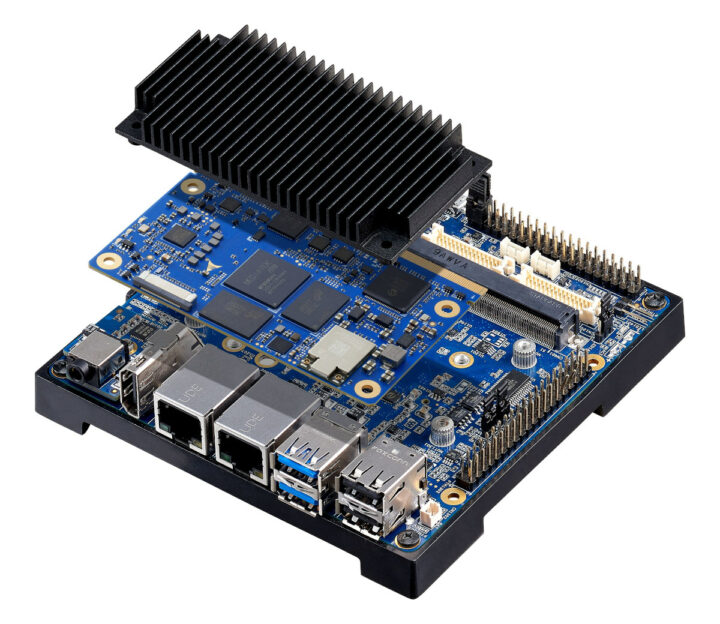
All information is preliminary at this stage, and you can find more details on the product page for the NXP i.MX 95 SMARC 2.1 module as well as on the i-Pi website for the evaluation kit.
iWave iW-RainboW-G61M
iW-RainboW-G61M key features and specifications:
- SoC – NXP i.MX 95 as described above
- System Memory – 16GB LPDDR5
- Storage – 16GB eMMC Flash and 16Mbit QSPI Flash
- Wireless – Wi-Fi 6 & Bluetooth 5.3 connectivity
- 314-pin MXM edge connector
- Storage – 4-bit SD
- Display Interfaces – 2x LVDS, 1x HDMI
- Camera – 4-lane MIPI CSI, 2-lane MIPI CSI
- Audio – 2x I2S
- Networking
- 2x Gigabit Ethernet interfaces
- 1x SerDes (10Gbps)
- USB – 4x USB 2.0 Host, 1x USB 3.0 OTG
- PCIe – 2x PCIe 3.0 x1
- Other peripherals – 2x CAN, 3x I2C, 2x SPI, 2x UART with CTS & RTS, 1x UART without CTS & RTS, 14x GPIOs
- Debug UART
- Power Input – 5V/ 2.5A through SMARC Edge Connector
- Dimensions – 82 x 50mm (SMARC v2.1.1 Standard)
- Temperature Range – -40°C to +85°C
- Environmental certifications – REACH & RoHS3 Compliant
Software support is somewhat confusing as iWave Systems lists both a Linux 6.6 BSP and support for Linux 6.1.55… The company also provides an evaluation kit with access to all features from the SMARC system-on-module
Evaluation Kit main features:
- Storage – SD card slot
- Video Output – HDMI Type-A connector, 20-pin LVDS connector
- Camera I/F – MIPI CSI camera connector
- Audio – 2x Audio In & Out Jack through I2S codec
- Networking – 2x Gigabit Ethernet RJ45 jacks
- USB
- 2x USB 2.0 Host Type-A ports
- 1x USB 2.0 OTG Type microAB port
- 1x USB 3.0 Host Type-A port
- 1x USB 3.0 Type-C OTG port
- 2x CAN header
- Expansion
- 1x PCIe slot
- M.2 KEY-B PCIe socket
- GPIO headers
- Power Supply – 12V/2A via DC jack
- Dimensions – 120x120mm (Nano-ITX motherboard)
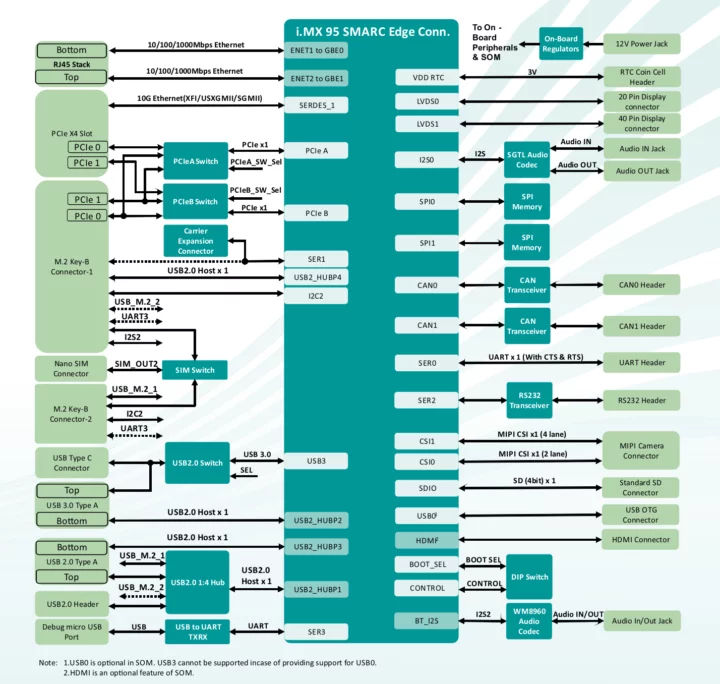
iWave Systems provides various enclosure and cooling solutions for the evaluation kit. More details about the SoM and devkit can be found on the product page.
We haven’t talked about pricing and availability yet. That’s because while NXP likely started offering i.MX95 processor samples to customers at the end of last year, the company is now expecting mass production to start in Q4 2024 or Q1 2025. I also noticed two other upcoming NXP i.MX95 SMARC modules, namely the Advantech ROM-5820 and Avnet SM2S-IMX95, so there will be plenty of options in due time.

Jean-Luc started CNX Software in 2010 as a part-time endeavor, before quitting his job as a software engineering manager, and starting to write daily news, and reviews full time later in 2011.
Support CNX Software! Donate via cryptocurrencies, become a Patron on Patreon, or purchase goods on Amazon or Aliexpress


